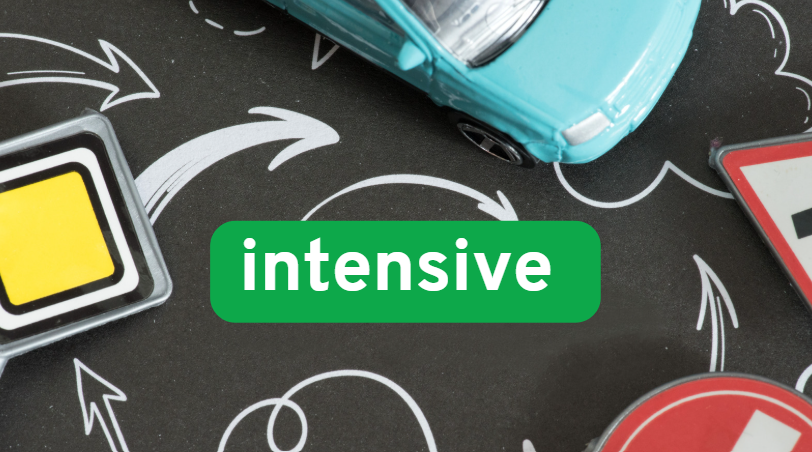Should You Do an Intensive Driving Course or Weekly Lessons?
- Ossie Sitki
- Jun 4
- 5 min read

When you're ready to learn to drive, one of the biggest decisions you’ll face is how you want to learn:Should you go for a fast-track intensive driving course, or take the traditional route with weekly lessons?
Both options have their pros and cons—what works best will depend on your lifestyle, budget, experience, and how you learn best. In this blog, we’ll break down both choices so you can decide which is the right route for you.
🕐 What Is an Intensive Driving Course?

An intensive driving course is designed to get you ready for your test in a very short period—often 5 to 10 days, depending on your previous experience. You’ll take several hours of driving per day, usually back-to-back, and aim to take your driving test immediately after completing the course.
There are different types of intensive courses:
Beginner courses (30–50+ hours)
Refresher or intermediate courses (10–30 hours)
Test rescue or retest prep (5–10 hours)
These courses are ideal for people who want to learn quickly due to work commitments, upcoming moves, or other time pressures. The entire learning process is condensed, meaning you must stay highly focused. Often, these courses are booked along with a fast-tracked driving test slot. Some learners combine theory revision and practice alongside the course. It’s a “crash course” in the best sense—fast, focused, and intensive.

🧾 Pros of Intensive Courses
✅ Faster learning: Perfect if you want to pass quickly—ideal for students, new job seekers, or expats.
✅ High immersion: Learning every day helps build momentum and keeps information fresh.
✅ Good for focused learners: Great if you like structure and can dedicate a full week or two to learning.
You avoid the risk of forgetting what you’ve learned between weekly lessons. Some students find that daily repetition helps them retain manoeuvres better. You also get a consistent teaching style with one instructor, which creates a solid learning rhythm. Booking lessons all at once guarantees you won’t be delayed by instructor availability.
❌ Cons of Intensive Courses
❌ Mentally tiring: 4–6 hours a day of driving can be exhausting, especially if you're new behind the wheel.
❌ Limited time for reflection: You may not have much time to absorb and practice new skills between lessons.
❌ Cost upfront: You’ll usually need to pay in advance, which may not be affordable for everyone.
❌ Not ideal for nervous drivers: If you need time to build confidence, a slower pace might be better.
Because everything moves quickly, mistakes can pile up fast if you’re not careful. Some learners feel overwhelmed by the pace, especially when learning multiple new skills in a single day. If you miss a day due to illness or personal reasons, rescheduling can be difficult. Intensive courses often focus more on test preparation than long-term road confidence. Also, booking both the instructor and the test date in sync can be tricky.
🗓️ What About Weekly Driving Lessons?

Weekly lessons—typically 1–2 hours per week—are the traditional way most learners approach driving. You book lessons over a longer period, gradually building up your experience.
It’s the preferred method for most learners in the UK, especially those with limited availability. Weekly lessons allow for more reflection and skill retention between sessions. They work well for people juggling work, education, or family life. This format provides more time to study theory in parallel. You also get more opportunities to practice outside lessons with friends or family.

✅ Pros of Weekly Lessons
✅ Easier to absorb: You have time between lessons to reflect, review, and ask questions.
✅ Flexible pace: You can increase or reduce the frequency depending on your progress or availability.
✅ Ideal for busy schedules: Perfect for students, workers, or parents who can’t commit to full-day sessions.
✅ Better for anxious learners: Allows you to gain confidence slowly, with regular feedback from your instructor.
Weekly learning helps build safer long-term habits, as skills are repeated and reinforced over time. You can spread out costs, making it financially manageable. If you need a break between lessons, you can pause and pick up again later. You get more time to prepare for the theory test alongside driving. Overall, it’s a gradual and steady learning approach that fits most lifestyles.
❌ Cons of Weekly Lessons
❌ Takes longer overall: Spreading lessons over weeks or months may delay your test date.
❌ Gaps can cause setbacks: Long gaps between lessons may cause you to forget skills.
❌ Less intensive: You may need to top up with extra practice (e.g., private driving with family) to stay sharp.
Missing lessons due to holidays, illness, or other commitments can cause a loss of continuity. You may end up repeating topics if too much time passes between lessons. Waiting for your instructor’s next availability can sometimes slow your momentum. Learners may forget test routes and specific skills if not practiced consistently. The extended timeline may also delay your transition to independent driving.
💭 Which Option Is Right for You?

Ask yourself the following questions:
🕐 How soon do I need my licence?If you’re under pressure to pass quickly, an intensive course may be worth it.
💰 What’s my budget?Intensive courses can be more cost-effective per hour, but the upfront cost is higher.
📚 Am I better at learning fast or gradually?If you prefer to take your time and absorb things slowly, weekly lessons are a safer bet.
🚙 Do I have any driving experience already?If you've driven abroad or had lessons before, a shorter intensive course might work well.
😌 How confident am I behind the wheel?Nervous drivers tend to benefit more from weekly lessons and a calmer pace.
You should also consider your schedule—do you have one or two weeks free to focus solely on driving? Or do you have other commitments that limit your availability? Speak with an instructor who can assess your current level and make a tailored recommendation. Taking a trial lesson is a smart first step before deciding. Remember, your goal is not just to pass the test—but to feel confident and safe on the road long after.
🔑 Our Recommendation
At our driving school, we offer weekly and semi-intensive driving lesson options—depending on the availability of our instructors. We always recommend starting with a taster lesson, where one of our qualified instructors will assess your current skill level, confidence, and learning style.
Based on that first session, we can recommend the most suitable approach for you. Whether you're looking to spread lessons out weekly or want to learn faster through a semi- or fully intensive course, we’ll do our best to match you with an instructor whose schedule fits your goals.
Whenever possible, we advise sticking with the same instructor throughout your learning journey—especially one familiar with your local area and test centre. This consistency often results in faster progress and fewer extra lessons. No matter which path you choose, we’re here to support you in building lifelong driving skills and passing your test with confidence.
📞 Ready to Start?
Get in touch today to book your assessment lesson, and we’ll help map out your journey to passing your test.








Comentarios